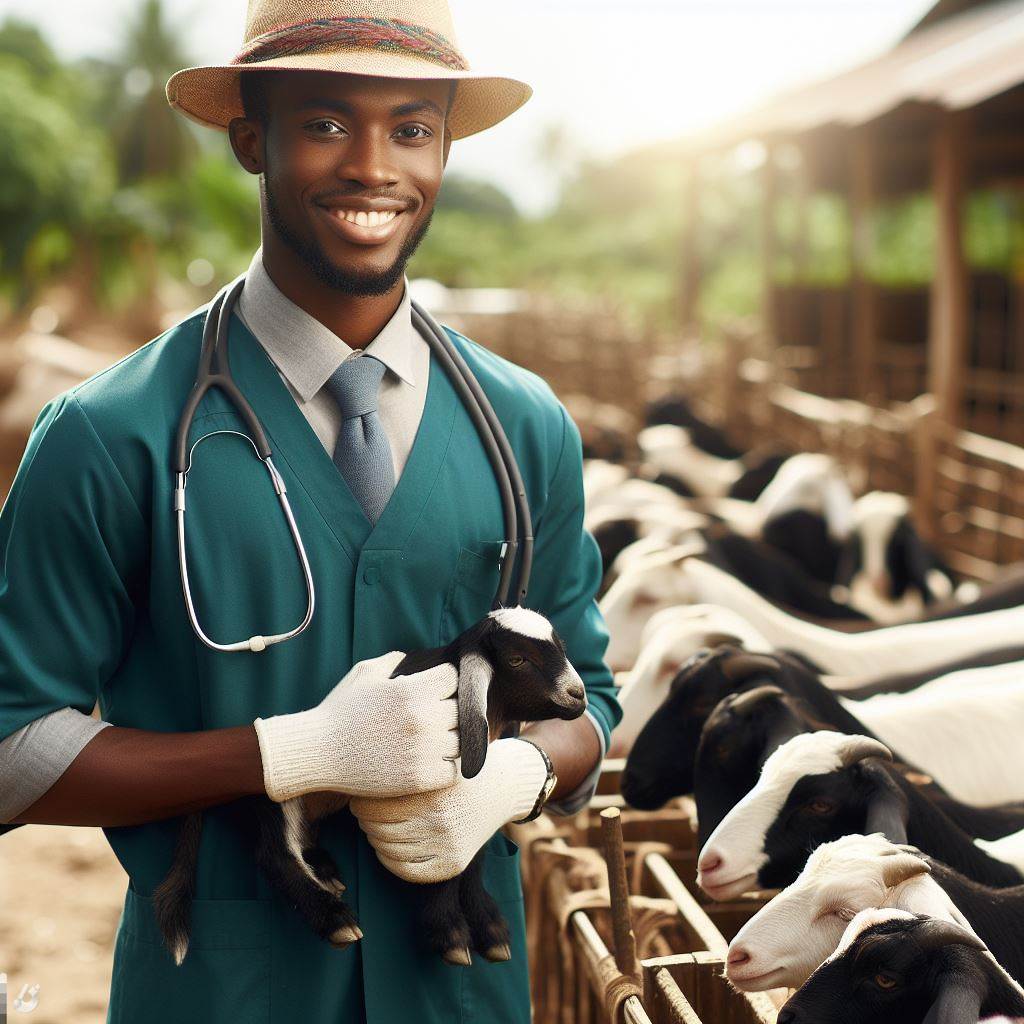Introduction
Animal production education in Nigeria has been a dynamic field, constantly evolving to meet the needs of the agricultural industry.
Initially, it focused on basic livestock management techniques, but over time, it has expanded to incorporate new technologies and practices.
The evolution of animal production education in Nigeria is of great importance for several reasons.
Firstly, it provides insights into the effectiveness of past educational approaches and helps identify areas for improvement.
By understanding what has worked in the past, educators can build upon successful strategies and ensure a higher quality of education.
Secondly, the study of the evolution of animal production education allows us to assess the impact of technological advancements on the industry.
As new technologies are introduced, such as genetic engineering and precision farming, education needs to adapt accordingly to prepare students for these changes.
By analyzing the evolution of the field, educators can ensure that students receive a comprehensive education that equips them with the relevant knowledge and skills.
Finally, studying the evolution of animal production education provides valuable historical context.
It allows us to appreciate the progress made in the field and the contributions of pioneers, while also highlighting the challenges that still need to be addressed.
In essence, the evolution of animal production education in Nigeria has been a significant undertaking.
By studying its development, we can improve educational approaches, adapt to new technologies, and appreciate the progress made while also recognizing the challenges that lie ahead.
Early developments in animal production education
Introduction of animal husbandry courses
During the early stages of animal production education in Nigeria, there was a significant introduction of animal husbandry courses.
These courses aimed to provide students with practical knowledge and skills to manage and care for livestock.
Students learned about breeding, nutrition, disease control, and other aspects related to animal production.
Establishment of agricultural colleges and research institutes
As the demand for animal production education grew, agricultural colleges and research institutes were established.
These institutions played a crucial role in training students and conducting research in animal production.
They provided specialized education and produced professionals who were equipped to contribute to the agricultural industry.
Focus on traditional farming techniques
In the early stages, the focus of animal production education was primarily on traditional farming techniques.
Students were taught methods passed down through generations, such as extensive grazing and indigenous breeds.
This approach aimed to preserve traditional knowledge and empower farmers with practical skills.
Challenges faced in the early stages
Despite the progress made, animal production education in Nigeria faced several challenges during its early stages.
Limited resources, including funding and infrastructure, hindered the expansion of educational programs.
Inadequate training facilities and a lack of qualified instructors posed additional obstacles.
However, these challenges did not deter the commitment to advancing animal production education in Nigeria.
Overall, the early developments in animal production education in Nigeria laid the foundation for future growth and innovation.
The introduction of animal husbandry courses, establishment of agricultural colleges and research institutes, emphasis on traditional farming techniques, and the perseverance in overcoming challenges paved the way for a more comprehensive and impactful education system.
This section provides insights into the evolution of animal production education in Nigeria, demonstrating the dedication and resilience of those involved in shaping the industry.
Read: Overview of Animal Production Courses in Nigerian Universities
Influence of international collaborations
In recent decades, the evolution of animal production education in Nigeria has been greatly influenced by international collaborations.
These collaborations have brought about significant advancements in the field, including the introduction of modern animal production techniques, collaboration with international organizations and universities, and the impact of advanced research and technology transfer.
Introduction of modern animal production techniques
Through international collaborations, Nigeria has been able to incorporate modern animal production techniques into its educational curriculum.
This has led to the adoption of more efficient and sustainable methods of animal production, such as improved breeding techniques, better nutrition management, and enhanced disease control measures.
These modern techniques have helped Nigerian farmers increase their productivity and profitability while minimizing environmental impact.
Collaboration with international organizations and universities
International collaborations have fostered partnerships between Nigerian educational institutions and renowned international organizations and universities.
This exchange of knowledge and expertise has allowed Nigerian students and researchers to benefit from the experiences and resources of these institutions.
It has facilitated the development of joint research projects, student exchange programs, and scholarships that have enriched the animal production education in Nigeria.
These collaborations have also enhanced the curriculum by incorporating global best practices and the latest scientific discoveries.
Impact of advanced research and technology transfer
The influence of international collaborations is evident in the impact of advanced research and technology transfer in animal production education in Nigeria.
Through these collaborations, Nigerian researchers have gained access to cutting-edge technology, equipment, and research facilities.
Transform Your Career with Expert Guidance
Get personalized mentorship consulting that’s tailored to your unique path. Our expert advice is actionable and exclusive.
Get StartedThis has enabled them to conduct high-quality research and develop innovative solutions to address the challenges in animal production.
The transfer of advanced technology and research findings has also benefitted farmers and industry professionals, who can now apply these findings to improve their practices and increase their productivity.
In fact, the evolution of animal production education in Nigeria has greatly benefited from international collaborations.
The introduction of modern animal production techniques, collaboration with international organizations and universities, and the impact of advanced research and technology transfer have all contributed to the growth and development of the field.
These collaborations have not only enhanced the educational curriculum but have also improved the productivity, sustainability, and profitability of animal production in Nigeria.
Continued collaborations with international partners will undoubtedly continue to drive innovation and advancement in animal production education in the country.
Read: Emerging Research Areas in Animal Physiology within Nigeria
Development of specialized animal production programs
Introduction of Veterinary Medicine as a course of study
In the evolution of animal production education in Nigeria, one significant milestone was the introduction of Veterinary Medicine as a specialized course of study.
This development marked a crucial shift in recognizing the importance of animal health and care.
The establishment of Veterinary Medicine as a course of study was a response to the growing demand for experts in the field.
It aimed to equip students with the necessary skills and knowledge to diagnose, treat, and prevent diseases in animals.
This step was vital in ensuring the well-being of livestock and enhancing animal production practices in Nigeria.
Expansion of programs in Animal Science and Animal Health
Alongside Veterinary Medicine, there was also a significant expansion of programs in Animal Science and Animal Health.
These programs aimed to provide a broader understanding of animal production, management, and nutrition.
Animal Science programs focused on studying animal genetics, reproduction, and behavior.
It involved comprehensive research and practical training to improve the efficiency of animal production systems.
Animal Health programs, on the other hand, concentrated on disease prevention, control, and management.
The expansion of these programs was a strategic move to meet the growing demand for skilled professionals in animal production.
It helped bridge the gap between theoretical knowledge and practical application, ensuring the sustainability and profitability of the industry.
Creation of specialized departments and faculties in universities
To further enhance animal production education, specialized departments and faculties were established in various Nigerian universities.
These subdivisions allowed concentrated focus and resources dedicated to animal production studies.
The creation of specialized departments and faculties provided a platform for in-depth research, innovation, and collaboration.
It facilitated the development of advanced techniques and technologies to improve animal production practices.
Additionally, it allowed for effective dissemination of knowledge and expertise among students and professionals in the field.
Universities across Nigeria began to recognize the importance of animal production as a crucial sector for economic growth and development.
As a result, they invested in creating specialized departments and faculties to cater specifically to this discipline.
This move strengthened the education system in Nigeria, ensuring a steady supply of skilled graduates who could contribute to the growth of the animal production industry.
In short, the evolution of animal production education in Nigeria has seen the development of specialized programs that address the diverse aspects of animal health, science, and management.
The introduction of Veterinary Medicine as a course of study, the expansion of programs in Animal Science and Animal Health, and the creation of specialized departments and faculties in universities have all played a significant role in equipping students with the necessary skills and knowledge for successful careers in the animal production industry.
These advancements have not only improved animal health and welfare but also contributed to sustainable economic growth in Nigeria.
Read: Animal Physiology Internships and Training Opportunities in Nigeria

Role of government and policies
Government initiatives to promote animal production education
- Providing financial support for the establishment of animal production education institutions.
- Offering scholarships and grants to students pursuing animal production education.
- Organizing workshops, seminars, and training programs to enhance the quality of animal production education.
- Facilitating research and development in the field of animal production through funding and collaboration.
Establishment of regulatory bodies and accreditation processes
- The government has created regulatory bodies such as the National Board for Technical Education (NBTE) to oversee animal production education.
- These bodies set accreditation processes to ensure that institutions offering animal production education meet certain standards.
- Accreditation serves as a quality assurance mechanism, improving the credibility and competitiveness of animal production graduates.
Incorporation of animal production education in national development plans
- The government recognizes the importance of animal production in the overall development of the nation.
- Animal production education is included in national development plans to promote sustainable agriculture and food security.
- Government policies prioritize the training of skilled professionals in animal production to meet the demands of the sector.
The Nigerian government plays a crucial role in promoting animal production education through various initiatives, the establishment of regulatory bodies, and incorporation in national development plans.
These efforts are aimed at improving the quality of education and meeting the growing demands of the sector.
Read: Challenges and Triumphs of Architectural Tech Studies in Nigeria
Delve into the Subject: Understanding the Plant Breeding Process: A Beginner’s Guide
Current state of animal production education
Overview of the present curriculum and available programs
- The current curriculum in animal production education in Nigeria focuses on theoretical knowledge.
- Practical aspects are often neglected, with limited opportunities for hands-on training.
- Available programs mainly offer undergraduate courses in animal science and related fields.
- The curriculum covers topics such as animal nutrition, genetics, reproduction, and management practices.
Challenges faced by animal production education in Nigeria
- Limited facilities and inadequate infrastructure hinder the practical training of students.
- Shortages of qualified faculty and inadequate funding result in reduced quality of education.
- Lack of collaboration between academia and industry leads to a gap in practical skills desired by employers.
- Inadequate research and technological advancements limit the students’ exposure to current practices.
Opportunities and potential for growth and improvement
- Increased government funding and investment in infrastructure could enhance practical training.
- Collaboration between academia and industry can bridge the gap between theoretical knowledge and practical skills.
- Incorporating more field visits, internships, and practical projects into the curriculum can provide hands-on experience.
- Emphasizing research and development can enhance students’ exposure to modern techniques and advancements.
- Engaging with international institutions can foster knowledge exchange and introduce global best practices.
- Continuous professional development for faculty can improve teaching methodologies and update curriculum content.
- Encouraging entrepreneurship and promoting innovation can prepare students for self-employment and industry demands.
Overall, animal production education in Nigeria faces various challenges but also holds significant potential for improvement.
By addressing the shortcomings and seizing available opportunities, the curriculum and programs can evolve to meet the growing demand for skilled professionals in the animal production industry.
Conclusion
The key points discussed in the evolution of animal production education in Nigeria are:
- The need for a comprehensive curriculum that covers both theoretical and practical aspects
- The importance of including modern technologies and management practices
- The need for increased collaboration between universities, research institutions, and industry
Continually evolving animal production education in Nigeria is of utmost importance for:
- Improving the productivity and efficiency of the agricultural sector
- Addressing emerging challenges such as climate change and food security
- Enhancing the employability and competitiveness of animal production graduates
Potential future developments in the field of animal production education in Nigeria include:
- Integration of digital technologies for remote learning and research
- Expansion of practical training opportunities through partnerships with industry
- Inclusion of courses on sustainable and organic farming methods
- Integration of entrepreneurship and business skills into the curriculum
The continuous evolution of animal production education in Nigeria is crucial for the sustainable development of the agricultural sector, addressing emerging challenges, and preparing graduates for the changing demands of the industry.




